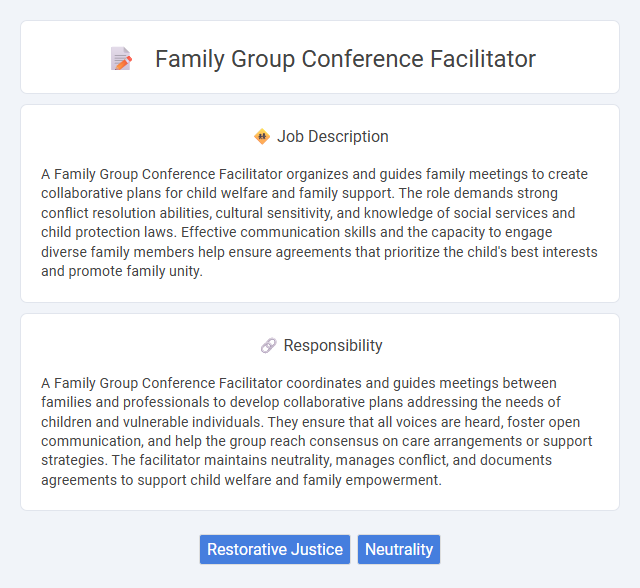
A Family Group Conference Facilitator organizes and guides family meetings to create collaborative plans for child welfare and family support. The role demands strong conflict resolution abilities, cultural sensitivity, and knowledge of social services and child protection laws. Effective communication skills and the capacity to engage diverse family members help ensure agreements that prioritize the child's best interests and promote family unity.
Individuals with strong communication skills and emotional resilience are likely to be well-suited for the role of a Family Group Conference facilitator, as the job involves managing sensitive family dynamics and fostering collaborative decision-making. Those who demonstrate empathy and the ability to remain neutral under pressure may have a higher probability of success in navigating complex situations involving vulnerable family members. Conversely, candidates who struggle with conflict resolution or lack patience might find this position challenging.
Qualification
A Family Group Conference Facilitator typically requires a background in social work, psychology, or counseling, combined with specialized training in family mediation and conflict resolution. Relevant qualifications often include certifications in facilitation techniques, knowledge of child protection laws, and experience working with diverse family dynamics. Strong communication skills, cultural competency, and the ability to manage sensitive situations are essential for effectively guiding family discussions toward collaborative decision-making.
Responsibility
A Family Group Conference Facilitator coordinates and guides meetings between families and professionals to develop collaborative plans addressing the needs of children and vulnerable individuals. They ensure that all voices are heard, foster open communication, and help the group reach consensus on care arrangements or support strategies. The facilitator maintains neutrality, manages conflict, and documents agreements to support child welfare and family empowerment.
Benefit
A Family Group Conference facilitator likely enhances communication and decision-making among family members, increasing the probability of reaching consensus in child welfare cases. This role often improves family engagement and empowerment, which may lead to better long-term outcomes for children involved. Effective facilitation could also reduce the need for court interventions, potentially saving time and resources for social services.
Challenge
Family group conference facilitators likely face the challenge of managing diverse emotions and conflicting interests among participants to ensure effective communication and collaboration. They probably need strong conflict resolution skills to navigate complex family dynamics and build consensus. Balancing neutrality while supporting families in decision-making could also present ongoing difficulties in this role.
Career Advancement
A Family Group Conference Facilitator plays a crucial role in guiding families through decision-making processes to ensure child welfare and support. Advancing in this career often involves gaining specialized certifications, such as mediation or social work licenses, and developing expertise in trauma-informed care and conflict resolution. Opportunities for growth include senior facilitator positions, training roles, or transitioning into social work management and policy development within child welfare organizations.
Key Terms
Restorative Justice
A Family Group Conference (FGC) facilitator plays a crucial role in restorative justice by guiding families and involved parties through structured dialogue to resolve conflicts and make decisions collectively. The facilitator ensures safety, fairness, and respect, helping participants develop agreements that repair harm and strengthen relationships. Expertise in active listening, cultural competency, and trauma-informed practices is essential to promote accountability and healing.
Neutrality
A Family Group Conference facilitator ensures impartiality by maintaining neutrality throughout the decision-making process, allowing all family members to voice their perspectives equally. The facilitator's role involves managing discussions without bias, fostering a supportive environment that encourages collaborative problem-solving. Neutrality is crucial to building trust, enabling fair outcomes that prioritize the welfare of children and families.
 kuljobs.com
kuljobs.com